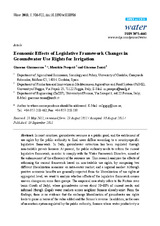Economic Effects of Legislative Framework Changes in Groundwater Use Rights for Irrigation
Autor
Prosperi, Maurizio
Zanni, Giacomo
Giannoccaro, Giacomo
Editor
MDPIFecha
2011Materia
Water marketsGroundwater
Water framework directive (WFD)
Economic assessment
METS:
Mostrar el registro METSPREMIS:
Mostrar el registro PREMISMetadatos
Mostrar el registro completo del ítemResumen
In most countries, groundwater resource is a public good, and the entitlement of
use rights by the public authority to final users differs according to a country-specific
legislative framework. In Italy, groundwater extraction has been regulated through
non-tradable private licenses. At present, the public authority needs to reform the current
legislative framework, in order to comply with the Water Framework Directive, aimed at
the enhancement of the efficiency of the resource use. This research analyzes the effects of
reforming the current framework based on non-tradable use rights, by comparing two
different liberalization scenarios: an intra-sector market, and a regional market. Although
positive economic benefits are generally expected from the liberalization of use rights at
aggregated level, we want to analyze whether effects of the legislative framework causes
uneven changes on some farm groups. The empirical case study refers to the Fortore river
basin (South of Italy), where groundwater covers about 50–80% of current needs, and
informal (though illegal) water markets across neighbor farmers already exist. From the
findings, there is no evidence that the exchange liberalization of groundwater use rights
leads to gains in terms of the value added and the farmer’s revenue. In addition, in the case
of an auction system regulated by the public authority, farmers whose water productivity is higher may be able to gain, while others may suffer some losses. In this case, resistances
from farmers’ associations towards the legislative framework reform may arise

